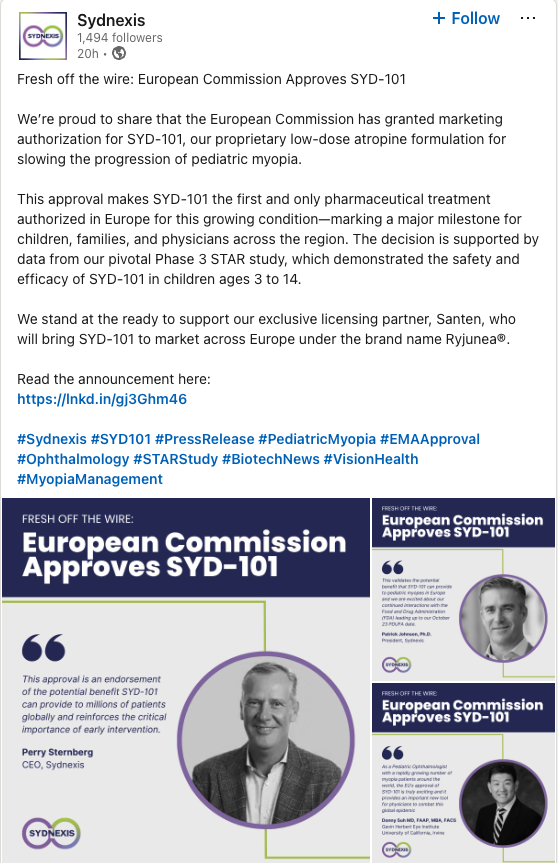Sydnexis’ SYD-101 low-dose atropine formulation is now the first pharmaceutical option in Europe for myopia.
The European Commission has granted marketing authorization for SYD-101, Sydnexis Inc.’s (California, United States) proprietary low-dose atropine formulation for slowing the progression of pediatric myopia.
The approval marks the first pharmaceutical treatment option authorized for myopia progression in European Union countries.
READ MORE: Taiwan’s Vision for Myopia Control: Prof. Maria Liu on MiSight® 1 Day Contact Lenses
The authorization covers children aged 3 to 14 years at treatment initiation and is based on data from the company’s Phase III STAR study. Santen (Osaka, Japan) holds exclusive licensing rights to commercialize SYD-101 in Europe, the Middle East and Africa (EMEA) under the brand name Ryjunea.
The approval follows a positive opinion from the Committee for Medicinal Products for Human Use (CHMP), issued in April.
Sydnexis is now waiting for word from the U.S. Food and Drug Administration (FDA) by its Prescription Drug User Fee Act (PDUFA) date of October 23, 2025.
“This marks a significant milestone for Sydnexis and, most importantly, for pediatric patients with progressive myopia, their families, and physicians as the first and only approved pharmaceutical treatment option in Europe,” said Perry Sternberg, chief executive officer of Sydnexis.
“This approval is an endorsement of the potential benefit SYD-101 can provide to millions of patients globally and reinforces the critical importance of early intervention.”
Clinical reception
Pediatric ophthalmologists have sought validated pharmaceutical treatment options for myopia progression. Low-dose atropine has been studied extensively in the eye care community, but SYD-101 represents the first approved formulation in Europe.
READ MORE: Outsmarting Myopia
“As a pediatric ophthalmologist with a rapidly growing number of myopia patients around the world, the EU approval of SYD-101 is truly exciting and it provides an important new tool for physicians to combat this global epidemic,” said Dr. Donny Suh from the Gavin Herbert Eye Institute at the University of California, Irvine. “The benefits of low-dose atropine have long been recognized in the eye care community, but we now finally have an approved and thoroughly vetted treatment option. This marks a new era in our ability to slow the progression of myopia and protect the vision of millions of children worldwide.”
Editor’s Note: This content is intended exclusively for healthcare professionals. It is not intended for the general public. Products or therapies discussed may not be registered or approved in all jurisdictions, including Singapore.

